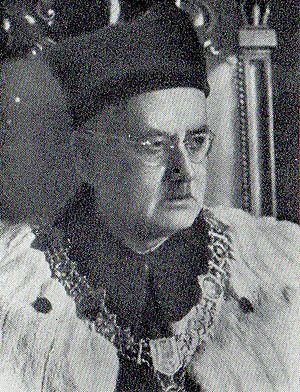Kazimierz Ajdukiewicz facts for kids
Quick facts for kids
Kazimierz Ajdukiewicz
|
|
|---|---|
 |
|
| Born | 12 December 1890 |
| Died | 12 April 1963 (aged 72) |
| Nationality | Polish |
| Alma mater | University of Lwów |
| Scientific career | |
| Fields | Logician |
| Notable students | Mojżesz Presburger |
Kazimierz Ajdukiewicz (born December 12, 1890 – died April 12, 1963) was an important Polish philosopher and logician. He was a key member of the Lwów–Warsaw school of logic, a famous group of thinkers.
Ajdukiewicz came up with many new ideas about how language works and how we understand meaning. One of his big ideas was categorial grammar. This is a flexible way to look at how sentences are built and what they mean. His work still influences how people study formal linguistics today. He also researched model theory and the philosophy of science.
About Kazimierz Ajdukiewicz
Kazimierz Ajdukiewicz was born in 1890 in a town called Tarnopol. At that time, this area was part of Austria-Hungary, not Poland. His father worked as a senior government official.
Ajdukiewicz went to the University of Lwów to study. Later, he taught at this university, as well as in Warsaw and Poznań. He earned his PhD by writing about the ideas of the famous philosopher Immanuel Kant.
From 1948 to 1952, he was the head, or Rector, of the University of Poznań. He also helped start the modern version of the journal Studia Logica. He was an editor for this journal from 1953 until he passed away.
His Ideas on Language and Meaning
In his early work, Ajdukiewicz developed a system he called Radical Conventionalism. He looked at any language as a collection of words and sentences. He believed that languages have "rules of meaning." These rules explain how one expression relates to another, or to information from the real world.
He described three types of these rules:
- Axiomatic rules: These are like basic truths that don't need proof.
- Deductive rules: These help us figure out new information from what we already know.
- Empirical rules: These connect language to things we observe or experience.
By following these rules, he thought we could understand all the sentences that can be known in a language. However, he also realized that some languages might have "disconnected" sentences. These sentences are only partly understood by the meaning rules.
Ajdukiewicz believed that when we use a language, especially in science, we also need a "conceptual apparatus." This is a set of meanings that cannot be directly translated. It also helps us choose which problems to solve. Because of this, his theory is a form of conventionalism. It's called "radical" because even simple reports of what we experience are affected by these language-wide ideas. As the 1930s went on, Ajdukiewicz moved away from this specific theory.
See also
 In Spanish: Kazimierz Ajdukiewicz para niños
In Spanish: Kazimierz Ajdukiewicz para niños
 | Delilah Pierce |
 | Gordon Parks |
 | Augusta Savage |
 | Charles Ethan Porter |

